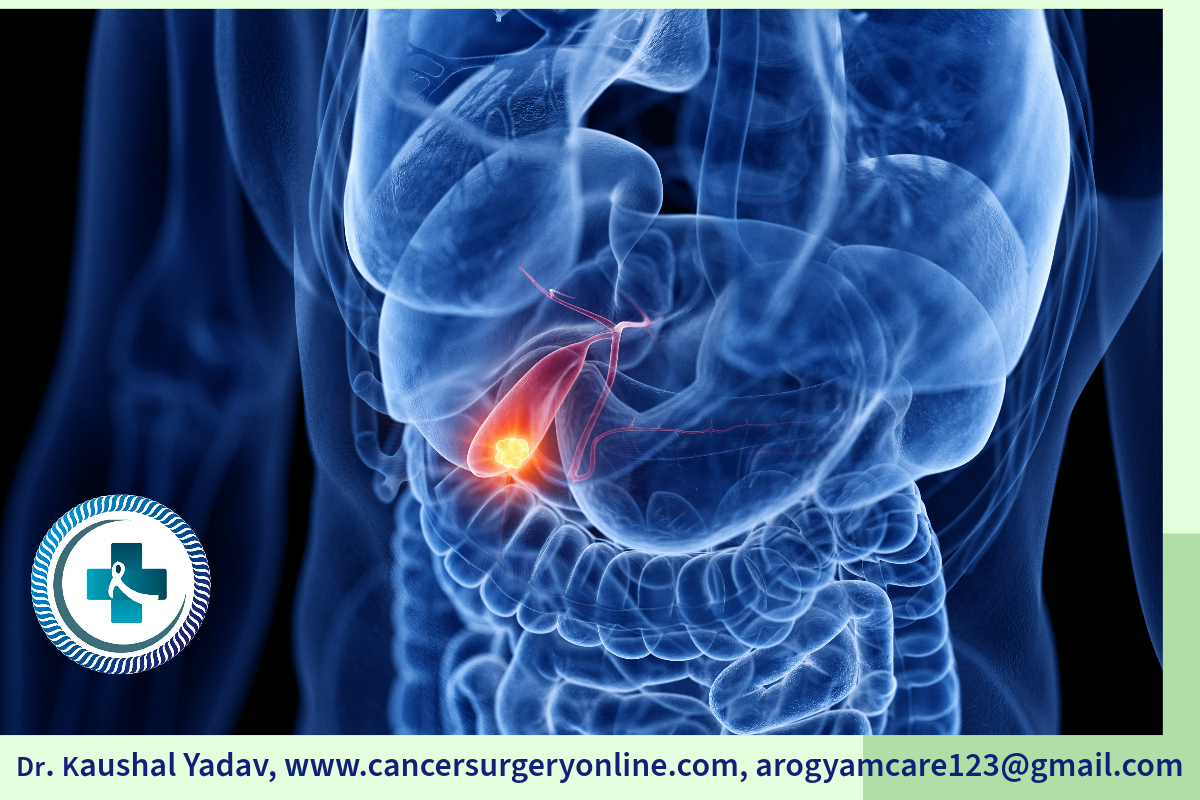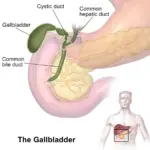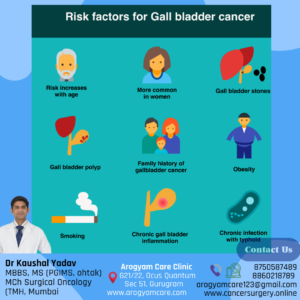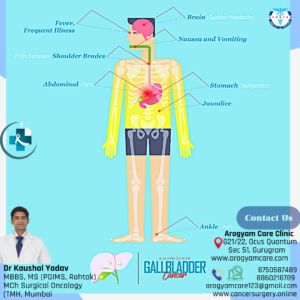Gallbladder Cancer

Gall bladder is pear shaped organ situated below liver. It stores the bile produced in liver and release it in intestine through bile duct at time of food digestion. Malignant cells in gall bladder leads to gall bladder cancer
Gall bladder cancer is less common but it mostly present in late stages. In India, the risk of developing gall bladder cancer is highest among north and North-east population while it is lowest among South Indians

Risk Factors/ causes of Gallbladder Cancer
A risk factor is anything that affects your chance of getting a disease such as cancer. Different cancers have different risk factors. Some risk factors, like smoking, can be changed. Others, like a person’s age or family history, can’t be changed. But having a risk factor, or even several risk factors, does not mean that a person will get the disease. And many people who get the disease may have few or no known risk factors. Many of causes of this cancer are related in some way to chronic inflammation (irritation and swelling) in the gallbladder.
- Age : more common beyond 40 years

- Gallstones: Gallstones are the most common risk factor for gallbladder cancer. Gallstones are pebble-like collections of cholesterol and other substances that form in the gallbladder and can cause chronic inflammation. 90% people with gallbladder cancer have gallstones when they are diagnosed. But gallstones are very common, and gallbladder cancer is quite rare. Most people with gallstones never develop gallbladder cancer.
- Porcelain Gallbladder: gallbladder wall becomes covered with calcium deposits.. It increases the chances of developing gallbladder cancer
- Female Gender
- Obesity
- Gall Bladder Polyp: polyp larger than 1 cm are more likely related with cancer.
- Infection- chronic infection with salmonella- typhoid. More likely to develop GB cancer.
- Primary sclerosing cholangitis- a condition of bile duct inflammation.
- Choledochal Cyst
- Family History.
Alarmimg Signs and Symptoms of Gallbladder Cancer
Usually in early stages gall bladder cancer does not produce any symptoms. >80% cancer are diagnosed in late stages when it fatal. Benign diseases like gall stones and cholecystitis and early gall bladder cancer are often misunderstood because of similar symptoms. Because of this reason surgical oncologist and doctors advise to evaluate even minority of suspected symptom with care because early stage surgery by gall bladder cancer surgeon is only cure. Some of symptoms of gallbladder cancer includes:
Investigations to diagnose gallbladder cancer
- Ultrasound Abdomen: usually the initial investigation. It is very important to look at wall thickess of gall bladder, any mass lesion/ polyp, involvement of nearby organs.
- Blood Investigations: Tumor markers: most commonly S. CA 19-9 is used. It also helps in followup.
- CT scan/ PET CECT: for disease extent evaluation
- ERCP: usually done to relieve jaunce in patients who are not suitable for surgery initially
Stages of gallbladder cancer
href=”https://commons.wikimedia.org/w/index.php?”https://creativecommons.org/licenses/by-sa/4.0/” target=”_blank” rel=”noopener noreferrer”>CC BY-SA 4.0</a>
1- limited to gallbladder wall
2- spread beyond gallbladder wall
3 - Direct liver or lymph nodes spread
4 Distant liver or other organs spread
Best available Treatment of gallbladder cancer
Treatment of gallbladder cancer depends upon presentation with Surgical Oncologist. At the time of diagnosis in a cancer center gall bladder cancer can have two presentations: either localized/ limited disease or metastatic disease.
- Localized or Locoregional Carcinoma Gall bladder: when limited to gall bladder or direct involvement of liver or adjoining organ like colon.
- Diagnosed after Cholecystectomy – most common presentation of early disease.
Every Specimen of gall bladder removal Surgery should be sent for histopathological examination.
- Suspicious Imaging: Gall Bladder Cancer Suspected based on Investigations like ultrasound or CT scan
- Symptoms: present because of complications of advance disease: like jaundice, swelling.
- Diagnosed after Cholecystectomy – most common presentation of early disease.
- Metastatic Disease: When can has spread to other organs like lung, abdomen or liver portion/ lobe away from attachment of gall bladder.
Surgery: Main treatment advised by best oncologists for gall bladder cancer is surgery by cancer surgeon. Remove gall bladder and portion of Liver which may include hepatectomy. Surgery also excises the involved bile ducts along with reconstruction and draining lymph nodes. Timely surgery is the only curative treatment for this fatal disease.
- Radical Cholecystectomy: Remove gall bladder along with part of adjacent liver with surrounding lymph nodes.
- Radical Cholecystectomy with Bile Duct Excision and Hepaticojejunostomy: If bile draining ducts are involved by disease than these ducts are elso excised along with radical cholecystectomy. Bile duct continuity is restored by joining proximal hepatic bile duct portion with small intestine (Hepaticojejunostomy)
- Radical Cholecystectomy with Right/ Extended Right/ Central Hepatectomy: when there is extensive involvement of liver or involvement of one side of blood supply or one side of intrahepatic bile duct extensive involvement.
- Radical Cholecystectomy with enbloc excision of directly infiltrated nearby organ: directly infiltrated organs like colon or duodenum part can be removed along with radical cholecystectomy.
- When diagnosed after cholecystectomy: Completion Radical Cholecystectomy
- When suspected based upon imaging: Cholecystectomy with intraoperative frozen section.
Biopsy is not done in case of localized gallbladder cancer. Whenever diagnosis of cancer is suspected in gallbladder, a surgical oncologist should be involved in treatment for best outcomes.
- Complications/ Symptoms: Extensive Radical Cholecystectomy whenever operable.
- Metastatic Gall Bladder: Palliative Intent of treatmen
To Book Appointment for Cancer Surgery :
Integration of Multimodality Treatment
- Chemotherapy:
Usually given after surgery in advance gall bladder cancer for better long term control.
In metastatic stage IV disease chemotherapy is primary disease
- Targetted Therapy: have important role in advance/ metastatic disease. where medicine is given for specific receptors (targets) of cancer
- Immunotherapy: Acts with immune check points of cells and its role is emerging in colorectal cancer in specific patients.
- Radiation Therapy: sometimes given after surgery in locally advance cases after surgery for better long term control.
- ERCP / Percutaneous Biliary Stenting: Palliative treatment in the form of ERCP stenting and biliary bypass and enteric bypass in advance cases when curative surgery is not possible.
Related Video
Gallbldder cancer causes and prevention
Got some questions
Gallbladder cancer is primarily a disease cured by surgery. surgical oncologist / gastrointestinal cancer surgeon should be consulted for treatment of gall bladder cancer. unfortunately, most of these cases present in late stages when surgery is not possible. gastroenterologist, intervention radiology, medical oncologist and radiation oncologist provide care in certain advances cases and for some palliative relief. But whether a patient is suitable for cure or not is decided by cancer surgeon, so it is very important to discuss in detail with primary care provider. Contact Cancer Surgery clinic Arogyam Care at Gurugram, Delhi NCR or book online appointment for gall bladder cancer treatment in Gurgaon.
- If all relavant examination and investigations has been done than plan of treatment is finalized with gall bladder cancer cancer surgeon
- After deciding surgical procedure cost estimate can be taken from billing department or hospital. Clinic or hospital department coordinator will assist in case any help required. +918750587489,
- maintain healthy body weight, take appropriate treatment for gall bladder infection, typhoid and gall stones. Avoid tobacco, alcohol, preservatives and pollutants.
- You can consult us through our online consultation link. https://api.whatsapp.com/send/?phone=918750587489&text=I+am+Looking+for+an+appointment+with+Dr.+Kaushal+Yadav.+Please+Help&type=phone_number&app_absent=0
Best Doctor for gall bladder Cancer in Gurgaon says that 5-year survival rate for stage 1 cancer is 80%, which decreases to about 4% in stage 4 cancer.
Until and unless detected and operated early gall bladder cancer is very dangerous. chances of recurrence increase as stage increase with decrease in survival by 50% in stage III. Contact Dr Kaushal Yadav for Cancer Surgery & for gall bladder cancer treatment in Gurgaon, Haryana, Delhi-NCR, India
Second opinion is advisable if the treatment decision is bothering you, if too many treatment options are confusing you, or to be sure of most beneficial treatment approach.


